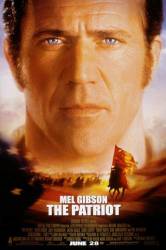Factual error: In the scene at Lord Cornwallis' outdoor party celebration, right after Benjamin Martin and his Continental Army blows up a British Ship, one of Lord Cornwallis' Captains throws back a big gulp of his drink from his Martini glass in grief and disbelief - the problem is this movie takes place in the mid 1700s and the Martini Glass wasn't invented until the 1920s, during the Roaring Jazz days.
Factual error: In one scene Lord Cornwallis' adjutant announces to Lord Cornwallis that a messenger (Benjamin Martin) has arrived. After initially dismissing the message, Lord C. pays attention on the mention of two "Great Danes" in Martin's company. The Great Dane as we know it today had many names over the centuries, but the Danish connection only became common use in the 19th century (Comte de Buffon - l'Histoire Naturelle - 1811). Until then the British would have called them Mastiffs (English or German), English Dogges, or perhaps even Boarhounds. Actually - the English Kennel Club of Britain didn't officially recognize the term/breed "Great Dane" until 1884.
Factual error: When Benjamin is handing a store clerk some money, he is giving him a $5 bill with Abraham Lincoln on it. This happened more than 80 years before he was president. And they didn't even use dollars during the Revolutionary war. They would have used British pounds.
Factual error: All soldiers in the Continental Army are wearing the same uniforms. Officers and enlisted men wore significantly different uniforms.
Factual error: The French only seem to show up at Yorktown in 1781, but they actually arrived in 1778 (the Americans would never have won if they arrived that late).
Factual error: During the American Revolution, men saluted by taking off their hat and lowering to their side, then putting it on again. In the movie, Gabriel (Heath Ledger) salutes by placing his hand on his head....the way we are used to now.
Factual error: When Benjamin Martin and his family go to Charleston, the first view we see of the city is a shot from a hilltop, looking down on the city from the north. Charleston is a port city in the "Lowcountry" of South Carolina, a broad coastal plain. Thus, the land around the city is extremely flat, and the nearest hill of that elevation is at least 80 miles inland.
Factual error: During the evening at the beach scenes, the sky over the sea appears as though it is during sunset. In the morning, the sunrise is in the same direction. A South Carolina beach would only face toward a sunrise.
Factual error: When Cornwallis is preparing to hang the militia they are testing the gallows which have trap doors, these were not yet being used at the time of the American Revolution. (Source director's commentary.) (01:27:00)
Factual error: In the scene where the Martins are leaving Charlestown to go to Santee, they are actually travelling south toward the west Ashley area of south Carolina. If they were actually travelling to Santee they would be heading northwest with Charlestown directly behind them.
Factual error: When Benjamin is trimming bullets he makes from toy soldiers, the tool he uses to trim them has a manufacturer's stamp on the handle, not something that should be there in this time period.
Factual error: In Gabriel's letter, he says his friend fell at Elizabethtown. The battle, which was actually the battle of Monmouth in NJ, was fought in June 1780, but when they show him getting shot it is blizzard conditions.
Factual error: Mel Gibson's son has toy soldiers from the future. In one shot when he is melting one of the soldiers it is visible. Although it has a red uniform it isn't a British soldier. In fact it depicts Hofburg Trabanten Leibgarde which was the personal guard of the sovereign originally from Austria, in uniform from around 1850 - 1918. (01:10:55)
Factual error: Throughout the film, all the women are running around without "modesty pieces," a scarf/shawl that would cover their shoulders and tuck into the front of their dress, so their breast tops were not exposed.
Factual error: During his preparation for the final battle Benjamin is making a bullet using a pair of Rapine bullet mold pliers. According to their records the Rapine Mold Company was not established until 1964.
Factual error: The scenes of the Battle of Yorktown are inaccurate. The view from the highest points of Yorktown is not of the ocean or even the Chesapeake Bay - it is of the York River. There would have been no way to see the French navy - they blockaded the entrance to the bay in early September (over 20 miles away), preventing resupply and reinforcement of the British forces. The French ships never fired on Yorktown. All of the artillery fired at Yorktown was land-based.
Factual error: French navy officers arriving at Yorktown to bomb the city are wearing tricolor roundels on their hats. This is historically impossible as the three colours blue white red representing France is a result of the French revolution that took place later in 1789. Before the revolution, the flag of France was just white with the symbol of the king.
Factual error: Gabriel claims that Charlston fell to Lord Cornwallis, however the town fell to Sir Henry Clinton, as Benjamin Clinton surrendered it to him after a little over a month long siege.






Answer: At the end of the film, it is implied that Charlotte and Benjamin Martin have married and had a child together. It wasn't alluded to earlier because it is meant to show that a person's life can start over, even after tragedy and loss.
raywest ★